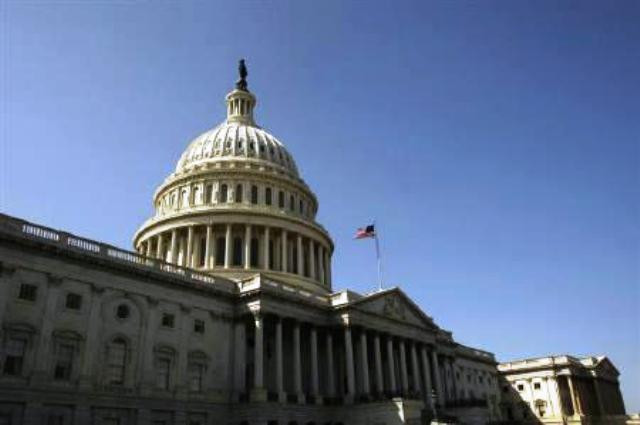US to debate bills calling for economic restrictions on Pakistan unless Nato routes reopen
US House Armed Services Committee, House Appropriations subcommitee approve bills.

US to debate bills calling for economic restrictions on Pakistan unless Nato routes reopen
The House Armed Services Committee overwhelmingly approved a draft of the National Defense Authorisation Act early Thursday morning. The draft bill calls for a bar on preferential import of goods and services from Pakistan and reducing aid to just 10% of available funds unless Pakistan re-opens the Nato supply route and extends cooperation.
According to a press release issued on Thursday, the bill will now be debated by the House next week. If the House of Representatives passes the bill, it will have to be approved by the US Senate and signed by the President before it becomes law.
The bill of the National Defense Authorisation Act for fiscal year 2013, was introduced by US House Armed Services Committee chairman Rep. Buck McKeon. He also called for a bar on support or reimbursement provided to Pakistan until the Secretary of Defense Leon Panetta provides a report on “the model for reimbursement, including how claims are proposed and adjudicated; new conditions or caveats that the Government of Pakistan places on the use of its supply routes; and the new cost associated with transit through supply routes in Pakistan.”
The new bill has also asked the Secretary of Defense to certify that Pakistan’s government is committed to taking action and supporting counterterrorism operations against al Qaeda, associated networks, Haqqani Network, domestic and foreign terrorist organisations, dismantling the IED networks and preventing proliferation of nuclear materials. The certification also has to cite whether Pakistan is committed to issuing visas “in a timely manner for United States visitors engaged in counterterrorism efforts and assistance programs in Pakistan.”
The bill of the National Defense Authorisation Act is stipulated for fiscal year 2013, while extending the Pakistan Counterinsurgency Funds, also requires the Secretary of Defense, with the Secretary of State’s agreement, to submit updates on what their strategy is to utilise the fund, and what metrics are used to determine progress in the PCF.
The draft bill also has a provision that would “limit the authority of the Secretary of Defense to obligate or expend funds made available to the Pakistan Counterinsurgency Fund during fiscal year 2013 to not more than 10 per cent of the amount available until such time as the update is submitted to the appropriate congressional committees.”
The draft bill will be debated on Wednesday, May 9, which, according to a press release, “extends the prohibition on the transfer of detainees from Guantanamo Bay to the United States.”
House Appropriations Subcommittee
In a separate bill, the US House Appropriations Subcommittee for State and Foreign Operations has called for no economic or security assistance to be given to Pakistan until the Secretary of State certifies that Pakistan is co-operating and taking action against terrorist networks. The bill, passed on Wednesday, has been referred to the full committee. No date has been announced for the full committee session yet.
According to the draft of the fiscal year 2013 State and Foreign Operations Appropriations Bill, the House subcommittee has proposed that no assistance under Economic Support Fund, International Narcotics Control and Law Enforcement, Foreign Military Financing Program and the Pakistan Counterinsurgency Capability Fund be released until the Secretary of State certifies to the Appropriations committee.
The Government of Pakistan, according to the draft bill, must cooperate with the US in counterterrorism efforts against the Haqqani Network, al Qaeda, Quetta Shura Taliban, Lashkar-e-Taiba, Jaish-e-Mohammad and other domestic and foreign terrorist organisations. Similarly, Pakistan must also end support or such groups and “prevent them from basing and operating in Pakistan and carrying out cross border attacks into neighbouring countries.” The draft bill says the US Secretary of State must certify that Pakistan is not supporting terrorist activities against US or coalition forces in Afghanistan.
In another stipulation, the certification requires that Pakistan’s military and intelligence agencies are not “intervening extra-judicially into political and judicial processes in Pakistan.” The draft bill also calls for Pakistan to dismantle the IED networks, prevent proliferation of nuclear material, and give humanitarian organisations access to detainees, IDPs and those affected by the conflict.
The Secretary of State will also have to certify that Pakistan is issuing visas in a timely manner to US visitors involved in counterterrorism or aid operations.
A press release on the subcommittee’s website says that the bill has slashed funding for the Global War on terror by $3 billion to $8.2 billion, which has reduced funding for programs in Iraq, Afghanistan and Pakistan.



















COMMENTS
Comments are moderated and generally will be posted if they are on-topic and not abusive.
For more information, please see our Comments FAQ